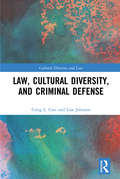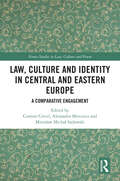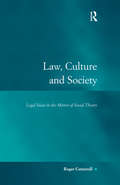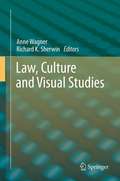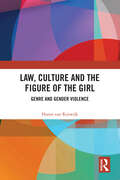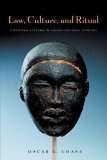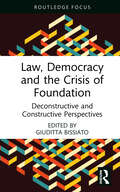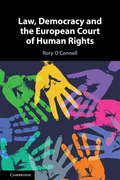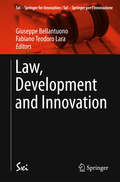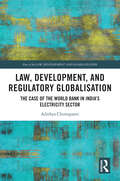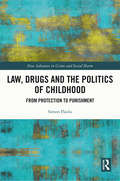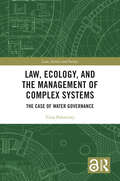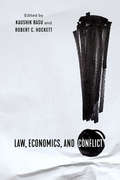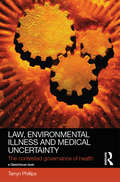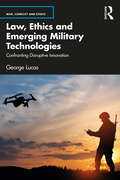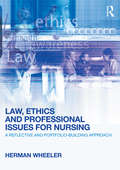- Table View
- List View
Law, Cultural Diversity, and Criminal Defense (Cultural Diversity and Law)
by Lisa Johnson Craig L. CarrAmerican legal scholars have debated for some time the need for a cultural defense in criminal proceedings where minority cultural information seems perti nent to a finding of criminal responsibility in situations where a minority cultural defendant has violated a valid criminal statute. This work presents a systematic analysis of this issue. Drawing from sociological, anthropological, and philosophical materials, as well as traditional legal discussions, the authors develop a scheme that indicates when cultural factors can be used as the basis for such a defense and when they are irrelevant to a finding of criminal responsibility. The argument moves from general concerns of social justice that apply under conditions of social and cultural pluralism to practical policy recommendations for the operation of American criminal justice. It thus connects more theoretical materials with the practical concerns of jurisprudence. The justification for legal recognition of a cultural defense in American criminal law is anchored firmly in American constitutional law.
Law, Culture and Identity in Central and Eastern Europe: A Comparative Engagement (Nomos Studies in Law, Culture and Power)
by Cosmin Cercel, Alexandra Mercescu and Mirosław Michał SadowskiMirosław Michał Sadowski is Lecturer at the University of Strathclyde in Glasgow, Scotland; Affiliated Researcher at the Centre for Global Studies, Alberta University in Lisbon, Portugal; Postdoctoral Researcher at CEBRAP – Brazilian Center of Analysis and Planning in São Paulo, Brazil; Research Assistant at the Institute of Legal Sciences, Polish Academy of Sciences in Warsaw, Poland.
Law, Culture and Society: Legal Ideas in the Mirror of Social Theory (Law, Justice And Power Ser.)
by Roger CotterrellThis book presents a distinctive approach to the study of law in society, focusing on the sociological interpretation of legal ideas. It surveys the development of connections between legal studies and social theory and locates its approach in relation to sociolegal studies on the one hand and legal philosophy on the other. It is suggested that the concept of law must be re-considered. Law has to be seen today not just as the law of the nation state, or international law that links nation states, but also as transnational law in many forms. A legal pluralist approach is not just a matter of redefining law in legal theory; it also recognizes that law's authority comes from a plurality of diverse, sometimes conflicting, social sources. The book suggests that the social environment in which law operates must also be rethought, with many implications for comparative legal studies. The nature and boundaries of culture become important problems, while the concept of multiculturalism points to the cultural diversity of populations and to problems of fragmentation, or perhaps to new kinds of unity of the social. Theories of globalization raise a host of issues about the integrity of societies and about the need to understand social networks and forces that extend beyond the political societies of nation states. Through a range of specific studies, closely interrelated and building on each other, the book seeks to integrate the sociology of law with other kinds of legal analysis and engages directly with current juristic debates in legal theory and comparative law.
Law, Culture and Visual Studies
by Anne Wagner Richard K. SherwinThe proposed volumes are aimed at a multidisciplinary audience and seek to fill the gap between law, semiotics and visuality providing a comprehensive theoretical and analytical overview of legal visual semiotics. They seek to promote an interdisciplinary debate from law, semiotics and visuality bringing together the cumulative research traditions of these related areas as a prelude to identifying fertile avenues for research going forward. Advance Praise for Law, Culture and Visual Studies This diverse and exhilarating collection of essays explores the many facets both historical and contemporary of visual culture in the law. It opens a window onto the substantive, jurisdictional, disciplinary and methodological diversity of current research. It is a cornucopia of materials that will enliven legal studies for those new to the field as well as for established scholars. It is a 'must read' that will leave you wondering about the validity of the long held obsession that reduces the law and legal studies to little more than a preoccupation with the word. Leslie J Moran Professor of Law, Birkbeck College, University of London Law, Culture & Visual Studies is a treasure trove of insights on the entwined roles of legality and visuality. From multiple interdisciplinary perspectives by scholars from around the world, these pieces reflect the fullness and complexities of our visual encounters with law and culture. From pictures to places to postage stamps, from forensics to film to folklore, this anthology is an exciting journey through the fertile field of law and visual culture as well as a testament that the field has come of age. Naomi Mezey, Professor of Law, Georgetown University Law Center, Washington, D.C., USA This highly interdisciplinary reference work brings together diverse fields including cultural studies, communication theory, rhetoric, law and film studies, legal and social history, visual and legal theory, in order to document the various historical, cultural, representational and theoretical links that bind together law and the visual. This book offers a breath-taking range of resources from both well-established and newer scholars who together cover the field of law's representation in, interrogation of, and dialogue with forms of visual rhetoric, practice, and discourse. Taken together this scholarship presents state of the art research into an important and developing dimension of contemporary legal and cultural inquiry. Above all, Law Culture and Visual Studies lays the groundwork for rethinking the nature of law in our densely visual culture: How are legal meanings produced, encoded, distributed, and decoded? What critical and hermeneutic skills, new or old, familiar or unfamiliar, will be needed? Topical, diverse, and enlivening, Law Culture and Visual Studies is a vital research tool and an urgent invitation to further critical thinking in the areas so well laid out in this collection. Desmond Manderson, Future Fellow, ANU College of Law / Research School of Humanities & the Arts, Australian National University, Australia
Law, Culture and the Figure of the Girl: Genre and Gender Violence
by Honni van RijswijkThis book argues for the critical potential of locating the girl as the subject-position and voice of legal critique.Law’s imaginary is notoriously limited in its ways of thinking through and adjudicating gender violence. This book argues that ‘the girl’ is a key figure through which to understand, theorise, and challenge law’s relation to this violence. Law, Culture and the Figure of the Girl explains the meaning and significance of the figure of the girl to legal, political, and critical projects centred on trauma and responsibility. The book offers new readings of exemplary cultural texts that thematically deal with law’s adjudication of violence against girls, emphasising the ways these texts challenge dominant ways of thinking and doing law, jurisdiction, violence, race, and gender. The book also explores radical cultural figurations of the girl in fiction, films, and TV series and demonstrates the critical potential of these works in understanding and providing counter-narratives to dominant legal and cultural imaginaries. These works provide ways not only to critique existing law but to theorise emergent forms of law-making.This book will be of interest to scholars in the areas of cultural legal studies, law and literature, feminist legal studies, and cultural studies. It will also be suitable as a prescribed text for upper undergraduate classes and graduate studies in the disciplines of law, legal studies, cultural studies, and criminology.
Law, Culture, and Ritual: Disputing Systems in Cross-Cultural Context
by Oscar G ChaseDisputing systems are products of the societies in which they operate—they originate and mutate in response to disputes that are particular to specific social, cultural, and political contexts. Disputing procedures, therefore, are an important medium through which fundamental beliefs, values, and symbols of culture are communicated, preserved, and sometimes altered. In Law, Culture, and Ritual, Oscar G. Chase uses interdisciplinary scholarship to examine the cultural contexts of legal institutions, and presents several case studies to demonstrate that the processes used for resolving disputes have a cultural origin and impact.Ranging from the dispute resolution practices of the Azande, a technologically simple, small-scale African society, to the rise of discretionary authority in civil litigation in America, Chase challenges the claims of some scholars that official dispute systems are more reflective of the interests and preferences of elite professionals than of the cultures in which they are embedded.
Law, Debt, and Merchant Power: The Civil Courts of 18th Century Halifax
by The Osgoode Society James MuirIn the early history of Halifax (1749-1766), debt litigation was extremely common. People from all classes frequently used litigation and its use in private matters was higher than almost all places in the British Empire in the 18th century. In Law, Debt, and Merchant Power, James Muir offers an extensive analysis of the civil cases of the time as well as the reasons behind their frequency. Muir's lively and detailed account of the individuals involved in litigation reveals a paradoxical society where debtors were also debt-collectors. Law, Debt, and Merchant Power demonstrates how important the law was for people in their business affairs and how they shaped it for their own ends.
Law, Democracy and the Crisis of Foundation: Deconstructive and Constructive Perspectives (Law and Politics)
by Giuditta BissiatoThis book addresses the crisis of the juridical-political foundation within contemporary democracies.Although modernity is the age of foundation, it is marked by what Carl Schmitt referred to as a peculiar ‘dialectic of presence and absence’ – and this is true even for those theories that seem to be the greatest supporters of the necessity of some kind of foundation, such as the Hobbesian commonwealth. This instability of foundation is inherent in the concept of ‘political representation’, which brings into being an idea – such as that of ‘nation’, ‘people’ or ‘popular will’ – which cannot, however, actually correspond to any empirical reality. Is it possible, then, to identify an absolute, certain and stable foundation capable of generating and guaranteeing the persistence of a legal and political structure? Or does this very question bind us to the history of an impossibility: a foundational absence, or void, whose presence is only now being strongly felt? Engaging both historical and contemporary perspectives, this book addresses the problem of foundation through both deconstructive and constructive perspectives – which respectively aim to challenge the very idea of foundation, or to overcome its contemporary crisis in order to present new, post-foundational possibilities.This book will be of interest to scholars and researchers working in the areas of legal and political theory.
Law, Democracy and the European Court of Human Rights
by Rory O'ConnellLaw, Democracy and the European Court of Human Rights examines the political rights jurisprudence of the European Court of Human Rights. It discusses how the Court supports a liberal representative and substantive model of democracy, and outlines the potential for the Court to interpret the Convention so as to support more deliberative, participatory and inclusive democratic practices. The book commences with an overview of different theories of democracy and then discusses the origins of the Council of Europe and the Convention and presents the basic principles on the interpretation and application of the Convention. Subsequent chapters explore issues around free expression, free assembly and association, the scope of the electoral rights, the right to vote, the right to run for election and issues about electoral systems. Issues discussed include rights relating to referendums, voting rights for prisoners and non-nationals, trade union rights and freedom of information.
Law, Development and Innovation
by Giuseppe Bellantuono Fabiano Teodoro LaraThis book deals with one strand of the intense debate concerning the links between law and development, namely the coordination of innovation processes and legal change. It analyzes how innovation, and ultimately development, can be fostered or hindered by existing or new legal infrastructures. The book includes eleven original contributions from senior and junior scholars and is divided into two parts, the first focusing on theoretical frameworks and the second presenting several case studies on various institutional aspects. A particular strength of this part is its broad geographical coverage, which encompasses the legal frameworks in Europe, the Americas, Africa, and Asia. The contributions collected in this book will be of value to a broad readership. Academic scholars will find useful information on lessons learned from reforms implemented in different areas and come to better understand the methodological hurdles involved in reform assessment. Policymakers in national and international organizations can draw on these studies when designing new programs. Lastly, practitioners in developed and developing countries can use these contributions to promote the success of current or new initiatives.
Law, Development and Regulatory Globalisation: The Case of the World Bank in India's Electricity Sector (Law, Development and Globalization)
by Adithya ChintapantiExploring the phenomenon of diffusion of legal norms accompanying economic globalisation in developing countries, this book examines the blanket imposition of standard regulatory templates, maintaining that every jurisdiction requires customised legal solutions. Adopted by over 80 developing jurisdictions, the World Bank’s 1993 regulatory template for electricity sector reform has been one of the most widely diffused regulatory models. This book uses the example of its implementation in India to address the more general process of regulatory globalisation for developing countries. Amongst other objectives, the World Bank’s template endeavoured to insulate economic decision making from politics through legal reform. Through this template, the World Bank endeavoured to transform the role of the Indian state in the electricity sector from an interventionist or welfare state to a neo-liberal regulatory state by imposing constitution-like obligations. The book demonstrates that the unique social, economic and political characteristics of a jurisdiction cannot be ignored when incorporating a regulatory template in a jurisdictional context; for, by influencing the way an external regulatory model is internalized, it is these characteristics that determine its outcome. Providing a detailed empirical analysis of this key aspect of development policy, this book will be of interest to scholars and students in the fields of law and development, politics and public administration; as well as development practitioners and policy makers involved in reforming sector regulatory frameworks in their countries.
Law, Disorder and the Colonial State
by Jonathan SahaIn this original study British rule in Burma is examined through quotidian acts of corruption. Saha outlines a novel way to study the colonial state as it was experienced in everyday life, revealing a complex world of state practices where legality and illegality were inseparable: the informal world upon which formal colonial power rested.
Law, Drugs and the Making of Addiction: Just Habits
by Kate SeearThis book considers how largely accepted ‘legal truths’ about drugs and addiction are made and sustained through practices of lawyering. Lawyers play a vital and largely underappreciated role in constituting legal certainties about substances and ‘addiction’, including links between alcohol and other drugs, and phenomena such as family violence. Such practices exacerbate, sustain and stabilise ‘addicted’ realities, with a range of implications – many of them seemingly unjust – for people who use alcohol and other drugs. This book explores these issues, drawing upon data collected for a major international study on alcohol and other drugs in the law, including interviews with lawyers, magistrates and judges; analyses of case law; and legislation. Focussing on an array of legal practices, including processes of law-making, human rights deliberations, advocacy and negotiation strategies, and the sentencing of offenders, and buttressed by overarching analyses of the ethics and politics of such practices, the book looks at how alcohol and other drug ‘addiction’ emerges and is concretised through the everyday work lawyers and decision makers do. Foregrounding ‘practices’, the book also shows that law is more fragile than we might assume. It concludes by presenting a blueprint for how lawyers can rethink their advocacy practices in light of this fragility and the opportunities it presents for remaking law and the subjects and objects shaped by it. This ground-breaking book will be of interest not only to those studying and working within the field of alcohol and drug addiction but also to lawyers and judges practising in this area and to scholars in a range of disciplines, including law, science and technology studies, sociology, gender studies and cultural studies
Law, Drugs and the Politics of Childhood: From Protection to Punishment (New Advances in Crime and Social Harm)
by Simon FlacksDebates about the regulation of drugs are inseparable from talk of children and the young. Yet how has this association come to be so strong, and why does it have so much explanatory, rhetorical and political force? The premise for this book is that the relationship between drugs and childhood merits more exploration beyond simply pointing out that children and drugs are both ‘things we tend to get worried about’. It asks what is at stake when legislators, lobbyists and decision-makers revert to claims about children in order to sustain a given legal or policy position. Beginning with a genealogy of the relationship between the discursive artefacts of ‘drugs’ and ‘childhood’, the book draws on Foucauldian methodologies to explore how childhood functions as a device in the biopolitical management of drug use(rs) and supply. In addition to analysing decriminalisation initiatives and sentencing measures, it (unusually) reaches beyond the criminal context to consider the significance of the ‘politics of childhood’ for law- and policymaking in the fields of family justice and education. It concludes by arguing that the currency of childhood and ‘youth’ is not reducible to rhetoric; it shapes the discursive entities of drugs and addiction and is one of the ways in which particular substances become socially, culturally and politically intelligible. At the same time, ‘drugs’ serve as a technology of child normalisation. The book will be essential reading for policymakers as well as researchers and students working in the areas of Criminal Justice, Law, Psychology and Sociology.
Law, Ecology, and the Management of Complex Systems: The Case of Water Governance (Law, Science and Society)
by Tiina PaloniittyThis book addresses the role of law in the adaptive management of socioecological systems. Recent years have witnessed a rise in discussion over the relation between adaptivity and law; as if after decades of insouciance, legal scholars have finally started to understand the impacts of the scientific paradigm called adaptive management to the legal sphere. Even though the complicated relations between law and the adaptive management of socioecological systems have become more debated, a thorough examination of the scientific and theoretical fundamentals of such endeavours has yet to be presented. Using the illustrative example of European Union water governance and its path towards embracing adaptive management, this book emphasises the legal significance of properly understanding the manner in which scientific knowledge of the environment is produced. Though always pivotal, rigorously apprehending science is especially crucial when dealing with the management of complex ecosystems as the ‘normative’ is created gradually before law begins to examine the ‘facts’ of the matter. After examining the roots of adaptive management, this book argues that the legal needs to understand itself as an integral part of the process of the socioecological management of complex systems, and not merely an external umpire resolving disputes. As whole the book offers new insights into the Union regulator’s approaches to scientific realities, making it an interesting read not only to academics and legal scholars but also to regulators striving to deepen their understanding or pondering which approach to adopt in the face of new regulatory challenges, and to scientists interested in the science and law aspects of their work.
Law, Economics and Finance of the Real Estate Market
by Rita Yi Man LiThe symbiosis between the law, economics and finance is evidenced in our daily lives. This book elucidates the relationship between these factors in Singapore and Hong Kong in direct and indirect real estate market. In Singapore, for example, there is an inseparable relationship between law, economics, finance and the HDB market. The book also showcases the concept of invitation to treat and offer, monetary compensation for environmental externalities under the lens of institutional economics. It also sheds light on the relationship between financial crisis, regulations, housing prices and indirect real estate market.
Law, Economics, and Conflict
by Kaushik Basu and Robert C. HockettIn Law, Economics, and Conflict, Kaushik Basu and Robert C. Hockett bring together international experts to offer new perspectives on how to take analytic tools from the realm of academic research out into the real world to address pressing policy questions. As the essays discuss, political polarization, regional conflicts, climate change, and the dramatic technological breakthroughs of the digital age have all left the standard tools of regulation floundering in the twenty-first century. These failures have, in turn, precipitated significant questions about the fundamentals of law and economics.The contributors address law and economics in diverse settings and situations, including central banking and the use of capital controls, fighting corruption in China, rural credit markets in India, pawnshops in the United States, the limitations of antitrust law, and the role of international monetary regimes. Collectively, the essays in Law, Economics, and Conflict rethink how the insights of law and economics can inform policies that provide individuals with the space and means to work, innovate, and prosper—while guiding states and international organization to regulate in ways that limit conflict, reduce national and global inequality, and ensure fairness.Contributors: Kaushik Basu; Kimberly Bolch; University of Oxford; Marieke Bos, Stockholm School of Economics; Susan Payne Carter, US Military Academy at West Point; Peter Cornelisse, Erasmus University Rotterdam; Gaël Giraud, Georgetown University; Nicole Hassoun, Binghamton University; Robert C. Hockett; Karla Hoff, Columbia University and World Bank; Yair Listokin, Yale Law School; Cheryl Long, Xiamen University and Wang Yanan Institute for Study of Economics (WISE); Luis Felipe López-Calva, UN Development Programme; Célestin Monga, Harvard University; Paige Marta Skiba, Vanderbilt Law School; Anand V. Swamy, Williams College; Erik Thorbecke, Cornell University; James Walsh, University of Oxford.Contributors: Kimberly B. Bolch, Marieke Bos, Susan Payne Carter, Peter A. Cornelisse, Gaël Giraud, Nicole Hassoun, Karla Hoff, Yair Listokin, Cheryl Long, Luis F. López-Calva, Célestin Monga, Paige Marta Skiba, Anand V. Swamy, Erik Thorbecke, James Walsh
Law, Environmental Illness and Medical Uncertainty: The Contested Governance of Health (Social Justice)
by Tarryn PhillipsWe’ve seen it before, with asbestos-related disease, leukaemia clusters and lung cancer caused by cigarettes. There tends to be a lag between the emergence of environmental risks and chemical injuries, and their recognition and therapeutic treatment by medicine and the law. Law, Environmental Illness and Medical Uncertainty examines how our society governs new health concerns as they emerge, and the barriers that face new and uncertain theories seeking recognition in the law. In this book, Tarryn Phillips focuses her investigation on the struggle over the controversial condition multiple chemical sensitivities, or MCS (also known as environmental illness). Presenting nine case studies where workers sought compensation for MCS from their multinational employers, she captures a nuanced portrait of their embittered, unequal battles over the scientific, legal and insurance paradigms for understanding toxic risk, environmental illness and the regulation of industry. It draws on three years of fieldwork in Australia, including interview data with lay people and sympathetic and sceptical experts, participant observation in the courtroom and textual analysis of official reports. The book gives a unique, ethnographic insight into the governance of risk and uncertainty within a neoliberal economy, medico-scientific controversies and courtroom dramas. It highlights how a skeptical approach towards emergent environmental concerns is encouraged within the current regime, and decision-makers face disincentives for taking a sympathetic approach. Compellingly written and easy to read, it should appeal widely to interested lay people, and students and scholars of science and technology studies, medical anthropology, sociology of health and illness, and critical legal studies.
Law, Ethics and Compromise at the Limits of Life: To Treat or not to Treat? (Biomedical Law and Ethics Library)
by Richard HuxtableA conflict arises in the clinic over the care of a critically ill, incapacitated patient. The clinicians and the patient’s family confront a difficult choice: to treat or not to treat? Decisions to withdraw or withhold life-sustaining treatment feature frequently in the courts and in the world's media, with prominent examples including the cases of Charlotte Wyatt, in the UK, and Terri Schiavo, in the USA. According to legislation like the Mental Capacity Act 2005, the central issues are the welfare (or ‘best interests’) of the patient, alongside any wishes they might have conveyed, via an ‘advance directive’ or through the appointment of a ‘lasting power of attorney’. Richard Huxtable argues that the law governing both welfare and wishes frequently fails to furnish clinicians and families with the guidance they require. However, he finds this unsurprising, given the competing ethical issues at stake. Huxtable proposes that there is a case for ‘principled compromise’ here, such that the processes for resolving principled disputes take precedence. He argues for greater ethical engagement, through a reinvigorated system of clinical ethics support, in which committees work alongside the courts to resolve the conflicts that can arise at the limits of life. Providing a comprehensive account of the law pertaining to children and adults alike, and distinctively combining medico-legal and bioethical insights, this book engages scholars and students from both disciplines, as well as informing clinicians about the scope (and limits) of law at the limits of life.
Law, Ethics and Emerging Military Technologies: Confronting Disruptive Innovation (War, Conflict and Ethics)
by George LucasThis book addresses issues of legal and moral governance arising in the development, deployment, and eventual uses of emerging technologies in military operations. Proverbial wisdom has it that law and morality always lag behind technological innovation. Hence, the book aims to identify, enumerate, and constructively address the problems of adequate governance for the development, deployment, and eventual uses of military technologies that have been newly introduced into military operations or which will be available in the near future. Proposals for modifications in governance, the book argues, closely track the anxieties of many critics of these technologies to the extent that they will proliferate, prove destructive in unanticipated ways, and partially or wholly escape regulation under current treaties and regulatory regimes. In addition to such concerns in domestic and especially in international law, the book addresses ethical norms in the professions involved in the design and eventual use of specific technologies, principally involving the professional norms of practice in engineering and the military (as well as biomedical and health care practice), which impose moral obligations on their members to avoid reckless endangerment or criminal negligence in the course of their activities. Thus, in addition to exploring the application of existing legal regimes and moral norms, the book examines how these professions might develop or improve the voluntary constraints on forms of malfeasance that are enshrined in their histories and codes of best practices. This book should prove of great interest to students of ethics, military studies, philosophy of war and peace, law, and international relations.
Law, Ethics and Professional Issues for Nursing: A Reflective and Portfolio-Building Approach
by Herman WheelerThis comprehensive new textbook covers core ethical and legal content for pre-registration nursing students. It provides readers with a sound understanding of the interrelationships between the NMC's code of conduct, standards and competencies, ethics and relevant sections of the English legal system. The only truly integrated text in the field, it opens with overviews of law and nursing, and ethical theories and nursing. It goes on to explore key areas of contention – such as negligence, confidentiality and consent – from legal and ethical perspectives, mapping the discussion onto the NMC code of conduct. The chapters include objectives, patient-focused case scenarios, key points, activities, questions, areas for reflection, further reading and a summary. Case law and statutes and ethical theories are presented where appropriate. Written by an experienced nurse-lecturer with a law and ethics teaching background, Law, Ethics and Professional Issues for Nursing is essential reading for all pre-registration nursing students, as well as students of other healthcare professions.
Law, Ethics and the Biopolitical
by Amy SwiffenLaw, Ethics and the Biopolitical explores the idea that legal authority is no longer related to national sovereignty, but to the ‘moral’ attempt to nurture life. The book argues that whilst the relationship between law and ethics has long been a central concern in legal studies, it is now the relationship between law and life that is becoming crucial. The waning legitimacy of conventional conceptions of sovereignty is signalled the renewal of a version of natural law, evident in discourses of human rights, that de-emphasises the role of a divine law-giver in favour of an Aristotelian conception of the natural purpose of life and the ‘common good’. Synthesising elements of legal scholarship on sovereignty, theories of biopolitics and biopower, as well as recent developments in the domains of ethics, Amy Swiffen examines the invocation of ‘life’ as a foundation for legal authority. The book documents the connection between law, life and contemporary forms of biopolitical power by critically analysing the fundamental principles of the bioethical paradigm. Unique in its critical and cross-disciplinary approach, Law, Ethics and the Biopolitical will be of interest to students and teachers in the areas of law and society, law and literature, critical legal studies, social theory, bioethics, psychoanalysis, and biopolitics.
Law, Ethics, and Policy in Healthcare Administration
by George PozgarThis chapter provides the reader with an overview of ethics, moral principles, virtues, and values. The intent here is not to burden the reader with the philosophical arguments sur¬rounding ethical theories, morals, and principles; however, as with the study of any new sub¬ject, "words are the tools of thought." The reader who thoroughly absorbs and applies the content of the theories and principles of ethics discussed herein will have the tools necessary to empathize with and guide patients through the conflicts they will face when making dif¬ficult care decisions. Therefore, some new vocabulary is a necessary tool, as a building block for the reader to establish a foundation for applying the abstract theories and principles of ethics in order to make practical use of them.
Law, Ethics, and the Visual Arts
by John Henry Merryman Stephen K. Urice Simon J. FrankelSince its first publication in 1979, Law, Ethics, and the Visual Arts has been the foundational text in the field of art law. This thoroughly reorganized and updated sixth edition takes a fresh look at primary materials and commentary from previous editions, extending the book's analysis with significant changes in format and content to reflect changes in the field. The book has multiple uses and audiences: a text for courses in law schools and graduate programs, a reference work for lawyers and museum professionals, and a lively read - filled with engaging legal stories and colorful anecdotes featuring the broad cast of characters in the art world. Complementing their own observations, the authors include excerpts from judicial opinions, scholarly and popular articles, international treaties, and statutory law. Law, Ethics, and the Visual Arts offers a cornucopia of examples, questions, issues, and lessons for students, artists, dealers, collectors, attorneys, and any reader curious about today's complex world of the visual arts.
Law, Fiction and Activism in a Time of Climate Change
by Nicole RogersThe book examines the narratives of climate change which have developed and which are currently evolving in three areas: law, fiction and activism. Narratives of climate change generated by litigants, judges, writers of fiction and activists are having, and will have, a profound effect on the way we respond to the climate change crisis. Acknowledging the prevalence of unreliable narrators, this book explores the reliability and significance of different forms of climate narrative. The author analyses overlapping themes and points of intersection, considering the recurrent motif of the trickster, the prominence of the child, the significance and ongoing viability of the rights discourse, and the increasingly prevalent emergency framing with its multiple implications for law’s empire. She asks how law, fiction and activism measure up as textual and performative fora for telling the story of climate change and anticipating a climate-changed future. And, in addition, how can they help foster transformative narratives which empower us to confront the climate change crisis? This highly topical, cross-disciplinary work will be of interest to anyone concerned about the growing climate emergency and makes a valuable contribution to climate law, environmental law, the environmental humanities and ecocriticism.
